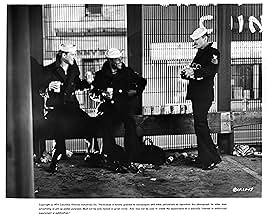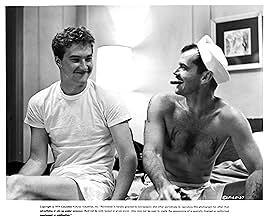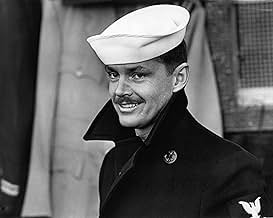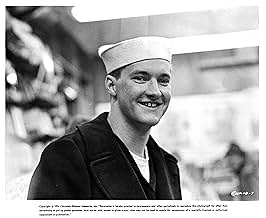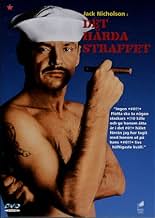CALIFICACIÓN DE IMDb
7.5/10
30 k
TU CALIFICACIÓN
Se ordena a dos marines que lleven a un joven delincuente a prisión, pero deciden que pase un último buen rato en el camino.Se ordena a dos marines que lleven a un joven delincuente a prisión, pero deciden que pase un último buen rato en el camino.Se ordena a dos marines que lleven a un joven delincuente a prisión, pero deciden que pase un último buen rato en el camino.
- Nominado a 3 premios Óscar
- 6 premios ganados y 9 nominaciones en total
Patricia Hamilton
- Madame
- (as Pat Hamilton)
- Dirección
- Guionistas
- Todo el elenco y el equipo
- Producción, taquilla y más en IMDbPro
Opiniones destacadas
Often regarded as a comedy-drama, 'The Last Detail' always stood out to me as a pure drama. It tells the story involving a group of Navy officers: a young and meek officer (Randy Quaid) steals some money but gets caught; the two others (Jack Nicholson and Otis Young) are to take him to prison. They (especially Nicholson) get somewhat attached to the boy when they see how young (ie.: don't know much of the world) and weak he is and decide to show him how to be a man before putting him away.
A look at the cast/crew shows how promising the film is. Hal Ashby is a fine director, whose films I always like/love (except maybe for 'Coming Home', which often gets too preachy and melodramatic); the screenplay is done by Robert Towne, the same guy who would later do 'Chinatown'; and the leading actor is Jack Nicholson, one of cinema's greatest actors.
Speaking of Jack Nicholson, he is just brilliant here. His character, 'Bad-Ass' Buddusky, is the type of character he is at best with: sarcastic and irreverent even when serious, yet very smart and caring in his own way. He acts as a father figure for the young Meadows (Quaid), trying to lift his mood and have him something to remember and be happy before having to face the harsh conditions of prison. Quaid and Young, alongside the supporting characters, end up overshadowed by Nicholson's performance, but they too make a great work with their characters.
As typical of a 70's and/or Hal Ashby film, 'The Last Detail' has great photography and is strangely comfortable to look at. The movie is very realistic too, with both situations and characters being very believable and sympathetic. The characters are very fleshed out and developed, making it difficult not to like or remain indifferent towards them. I've also heard that the way Navy/Marine officers are portrayed are also very close to the real thing, without forcing their portrayal as a way of criticism of the armed forces, which many directors would jump at the chance to do (specially considering the time this movie was made). In truth, I didn't feel that the film was a critique of the military like many say.
My only complaint on the movie is that it's supposed to be a comedy too. Yes, there are awkward situations and Jack Nicholson's typical rebellious way of dealing with everything; but the movie tends to make them more interesting than actually funny. Not that I'm saying this is bad; 'The Last Detail' is a remarkable movie in every aspect and one of the best pure dramas I've seen.
A look at the cast/crew shows how promising the film is. Hal Ashby is a fine director, whose films I always like/love (except maybe for 'Coming Home', which often gets too preachy and melodramatic); the screenplay is done by Robert Towne, the same guy who would later do 'Chinatown'; and the leading actor is Jack Nicholson, one of cinema's greatest actors.
Speaking of Jack Nicholson, he is just brilliant here. His character, 'Bad-Ass' Buddusky, is the type of character he is at best with: sarcastic and irreverent even when serious, yet very smart and caring in his own way. He acts as a father figure for the young Meadows (Quaid), trying to lift his mood and have him something to remember and be happy before having to face the harsh conditions of prison. Quaid and Young, alongside the supporting characters, end up overshadowed by Nicholson's performance, but they too make a great work with their characters.
As typical of a 70's and/or Hal Ashby film, 'The Last Detail' has great photography and is strangely comfortable to look at. The movie is very realistic too, with both situations and characters being very believable and sympathetic. The characters are very fleshed out and developed, making it difficult not to like or remain indifferent towards them. I've also heard that the way Navy/Marine officers are portrayed are also very close to the real thing, without forcing their portrayal as a way of criticism of the armed forces, which many directors would jump at the chance to do (specially considering the time this movie was made). In truth, I didn't feel that the film was a critique of the military like many say.
My only complaint on the movie is that it's supposed to be a comedy too. Yes, there are awkward situations and Jack Nicholson's typical rebellious way of dealing with everything; but the movie tends to make them more interesting than actually funny. Not that I'm saying this is bad; 'The Last Detail' is a remarkable movie in every aspect and one of the best pure dramas I've seen.
Nicholson's "Bad Ass" is a beautifully crafted piece of character. He cusses. He fights. He drinks. He's loud. No one else speaks Robert Towne's words better than Nicholson. In this film he overwhelms at every turn. In the bar scene, he shows brute anger and a desire for dominance. The scenes with a young Nancy Allen are delightfully witty because of Nicholson's schoolboy antics of getting a woman into bed.
It is the scenes with Randy Quaid (also wonderful) where Nicholson shines brightest. "Bad Ass" represents a paternal figure lacking in Meadows' life. He makes him a man by demanding he send back a hamburger if it's not cooked the way he likes it. He demands Meadows to stop crying and be a man. He demands Meadows to stand up for himself and fight when someone pushes his buttons. He demands Meadows to want to have sex, like other men his age. Nicholson's father figure image here is played off perfectly as Meadows sort of imitates things "Bad Ass" does. If Bad Ass has a beer, Meadows has a beer. If Bad Ass wants a woman, Meadows wants a woman. There's a secret trust between the two. It's unspoken, but it's there. That trust is broken in the end when Meadows tries to escape. It wasn't all a lie, Meadows just felt that it was time to stop learning and start moving.
It is the scenes with Randy Quaid (also wonderful) where Nicholson shines brightest. "Bad Ass" represents a paternal figure lacking in Meadows' life. He makes him a man by demanding he send back a hamburger if it's not cooked the way he likes it. He demands Meadows to stop crying and be a man. He demands Meadows to stand up for himself and fight when someone pushes his buttons. He demands Meadows to want to have sex, like other men his age. Nicholson's father figure image here is played off perfectly as Meadows sort of imitates things "Bad Ass" does. If Bad Ass has a beer, Meadows has a beer. If Bad Ass wants a woman, Meadows wants a woman. There's a secret trust between the two. It's unspoken, but it's there. That trust is broken in the end when Meadows tries to escape. It wasn't all a lie, Meadows just felt that it was time to stop learning and start moving.
Jack Nicholson is a performer with the rare ability to completely immerse himself in a chosen role and convince the audience of the stark reality of his performance. Playing Navy Signalman First Class Billy "Badass" Buddusky in Hal Ashby's 1973 film rendition of Darryl Ponicsan's novel, "The Last Detail" is a sterling example of that uncommon talent. Rough-edged but understanding, crude but compassionate, Buddusky and fellow "lifer" Gunner's Mate First Class "Mule" Mulhall (skillfully portrayed by Otis Young) are "detailed" as armed Shore Patrol guards to escort a young sailor, Larry Meadows (Randy Quaid) from Norfolk, Va. to a naval prison in Portsmouth, NH in order to serve an eight-year sentence after being convicted at a court-martial of petty theft.
The five-day journey northward is an adventure for all three. Sympathizing with Meadows's plight, apprised of his utter naivete and realizing his sentence far exceeds the severity of the offense, Buddusky and Mulhall conduct their version of a cram course in traditional male rights of passage--ranging from a drunken spree in Washington, D.C. to duking it out with Marines in New York City and getting their charge sexually initiated with a Boston prostitute--if for no other reason than to give him some taste of what he will not be experiencing for a long time and to teach him in some small way to assert himself as an individual.
Darryl Ponicsan's novel (which hit the racks at practically the same time the film had been released--the book's ending is quite different and, to me, is much less believable than the film's) was initially hailed as a polemic against what many believed was the cold indifference of the military establishment. However, since that time, it has been judged more a compelling "slice of life" drama about the complexities of everyday human behavior and how it is shaped by our own decisions and by entities beyond our immediate purview. And, more importantly, it forces us to think about how our ever-more-complicated society is increasingly unable to find ways to help its young people constructively mark transition into adulthood.
"The Last Detail" is a sadly overlooked but superb blend of pathos, ribald bittersweet humor, hard-edged '70s realism and insightful and subtle human drama, one that brashly and subtly brought back many personal memories of my Navy hitch and a work that says something to all of us by merely focusing upon a small "detail" of a sadly overlooked and unappreciated decade that was alternately (and simultaneously) bleak yet hopeful.
The five-day journey northward is an adventure for all three. Sympathizing with Meadows's plight, apprised of his utter naivete and realizing his sentence far exceeds the severity of the offense, Buddusky and Mulhall conduct their version of a cram course in traditional male rights of passage--ranging from a drunken spree in Washington, D.C. to duking it out with Marines in New York City and getting their charge sexually initiated with a Boston prostitute--if for no other reason than to give him some taste of what he will not be experiencing for a long time and to teach him in some small way to assert himself as an individual.
Darryl Ponicsan's novel (which hit the racks at practically the same time the film had been released--the book's ending is quite different and, to me, is much less believable than the film's) was initially hailed as a polemic against what many believed was the cold indifference of the military establishment. However, since that time, it has been judged more a compelling "slice of life" drama about the complexities of everyday human behavior and how it is shaped by our own decisions and by entities beyond our immediate purview. And, more importantly, it forces us to think about how our ever-more-complicated society is increasingly unable to find ways to help its young people constructively mark transition into adulthood.
"The Last Detail" is a sadly overlooked but superb blend of pathos, ribald bittersweet humor, hard-edged '70s realism and insightful and subtle human drama, one that brashly and subtly brought back many personal memories of my Navy hitch and a work that says something to all of us by merely focusing upon a small "detail" of a sadly overlooked and unappreciated decade that was alternately (and simultaneously) bleak yet hopeful.
The Last Detail by Hal Ashby is much like John Schlesinger's Midnight Cowboy in that they are both road trip movies as well as buddy movies. They are about friendships that forged in extreme circumstances and the effect that these experiences have on each character's lives.
In the last detail, an unfortunate seaman by the name of Meadows (Randy Quaid) is condemned to jail for eight years for a misdemeanor crime he was unable to even complete. Being caught with his hand in the cookie jar after a mere forty dollars, he is consequently transported from a naval base in the south to the naval prison in Portsmouth, Maine. The last detail of a few veteran naval officers, namely Billy "Bad Ass" Buddusky (Jack Nicholson) and "Mule" Mulhall (Otis Young) is to transport this eighteen year old, soon to be prisoner up the east coast.
The three gentlemen have never met before and all seem to have different interests. Billy and Mule are after some welcomed time off from the suffocating life on the naval base, while Meadows is drowning in his own depression. Billy is more of a lenient presence, while Mule seems to want to do his duty first and then relax. Soon the men form a bond. This bond and their relationship is what carry the movie. Meadows is an innocent and modest teenager who found his way into the navy because of a shop lifting problem. However, after hearing his story and spending time with the boy, the two officers realize the ludicrous charges that have been brought against such an undeserving soldier.
They take pity on him and decide to make his last days of freedom ones in which he will cross every right of passage yet to be undiscovered and make them days that he will never forget. As they gradually open up to each other, they grant the prisoner a certain degree of freedom beginning with the removal of the cuffs in the beginning of the movie. They get him drunk in Washington, D.C., involve him in his first fist fight in New York City and help him lose his virginity in Boston. Beyond these rights of passage, the officers also relate to the emotional side of Meadows. They allow him to visit his mother. What the two officers did not realize is that the journey they would take would be reciprocal. They all end up taking their guard down.
One of the more poignant lines in the film is when Meadows refers to the officers as his beast friends. Although he has only known them for less than a week, the sad fact is that these men are probably the closest friends that he has ever had. Mule and Billy have had much more life experience and are well versed in the details and idiosyncrasies that life involves. They connect with meadows because before this trip, he had been yet untouched by the worse side of life. His general doe eyed demeanor drives home the fact that he really does not deserve the treatment that he's receiving. Upon leaving the prison, I don't believe that Mule and Billy are so much angry with the way the ascending officer treated them as they are with the situation that Meadows is now faced with. "We could have prevented this.
In the last detail, an unfortunate seaman by the name of Meadows (Randy Quaid) is condemned to jail for eight years for a misdemeanor crime he was unable to even complete. Being caught with his hand in the cookie jar after a mere forty dollars, he is consequently transported from a naval base in the south to the naval prison in Portsmouth, Maine. The last detail of a few veteran naval officers, namely Billy "Bad Ass" Buddusky (Jack Nicholson) and "Mule" Mulhall (Otis Young) is to transport this eighteen year old, soon to be prisoner up the east coast.
The three gentlemen have never met before and all seem to have different interests. Billy and Mule are after some welcomed time off from the suffocating life on the naval base, while Meadows is drowning in his own depression. Billy is more of a lenient presence, while Mule seems to want to do his duty first and then relax. Soon the men form a bond. This bond and their relationship is what carry the movie. Meadows is an innocent and modest teenager who found his way into the navy because of a shop lifting problem. However, after hearing his story and spending time with the boy, the two officers realize the ludicrous charges that have been brought against such an undeserving soldier.
They take pity on him and decide to make his last days of freedom ones in which he will cross every right of passage yet to be undiscovered and make them days that he will never forget. As they gradually open up to each other, they grant the prisoner a certain degree of freedom beginning with the removal of the cuffs in the beginning of the movie. They get him drunk in Washington, D.C., involve him in his first fist fight in New York City and help him lose his virginity in Boston. Beyond these rights of passage, the officers also relate to the emotional side of Meadows. They allow him to visit his mother. What the two officers did not realize is that the journey they would take would be reciprocal. They all end up taking their guard down.
One of the more poignant lines in the film is when Meadows refers to the officers as his beast friends. Although he has only known them for less than a week, the sad fact is that these men are probably the closest friends that he has ever had. Mule and Billy have had much more life experience and are well versed in the details and idiosyncrasies that life involves. They connect with meadows because before this trip, he had been yet untouched by the worse side of life. His general doe eyed demeanor drives home the fact that he really does not deserve the treatment that he's receiving. Upon leaving the prison, I don't believe that Mule and Billy are so much angry with the way the ascending officer treated them as they are with the situation that Meadows is now faced with. "We could have prevented this.
If you respond to this film, you will probably go all the way and love it as much as I do. It is probably the high point of the drama of social realism started back by the like of "Marty."
It is Nicholson's film, yet Quaid and Otis Young(in his only good movie) really shine as well. It is the most heartbreaking of material played without sap or sentiment. Obscenity like this was still pretty new to movies back in 73, be sure to avoid edited T.V. versions. Reading the comments, it is sad that todays movie fans, spoonfed sledgehammer crappola, really can't respond to a drama played with the kind of subtle grace of "The Last Detail." Give it a shot. Ten out of ten.
It is Nicholson's film, yet Quaid and Otis Young(in his only good movie) really shine as well. It is the most heartbreaking of material played without sap or sentiment. Obscenity like this was still pretty new to movies back in 73, be sure to avoid edited T.V. versions. Reading the comments, it is sad that todays movie fans, spoonfed sledgehammer crappola, really can't respond to a drama played with the kind of subtle grace of "The Last Detail." Give it a shot. Ten out of ten.
¿Sabías que…?
- TriviaThe script was completed in 1970 but contained too much profanity to be shot as written. Columbia Pictures waited for two years trying to get writer Robert Towne to tone down the language. Instead, by 1972, the standards for foul language relaxed so much that all the profanity was left in.
- ErroresThe MAA Master Chief is not wearing a Master-at-Arms rating badge; he is wearing a Boatswain mate rating badge.
The Master At Arms rating was disestablished in 1921, but was officially re-established on 1 August 1973. Therefore, as the story takes place, a Master Chief Boatswain's Mate being assigned the collateral duty of MAA is entirely accurate.
- Bandas sonorasNever Let The Left Hand Know
by Jack Goga
Selecciones populares
Inicia sesión para calificar y agrega a la lista de videos para obtener recomendaciones personalizadas
- How long is The Last Detail?Con tecnología de Alexa
Detalles
- Fecha de lanzamiento
- País de origen
- Sitios oficiales
- Idioma
- También se conoce como
- The Last Detail
- Locaciones de filmación
- Productoras
- Ver más créditos de la compañía en IMDbPro
Taquilla
- Presupuesto
- USD 2,300,000 (estimado)
Contribuir a esta página
Sugiere una edición o agrega el contenido que falta



